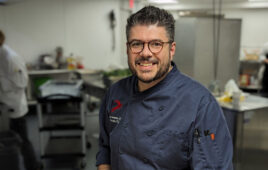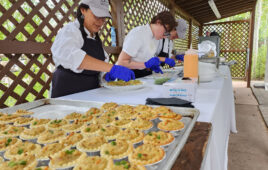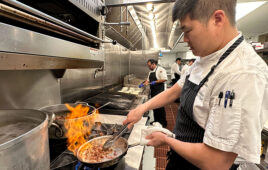
Sedalia CC’s calendar features dozens of events that include a meal. The club hosts approximately 20 golf tournaments per season and up to 60 members-only events.
Catering for a large, post-game crowd is a challenging feat. Banquet chefs must execute flavorful food en masse while maintaining excellence for members and guests. Factor in the rising cost of goods, limited staffing and other myriad challenges, club culinarians must become adept at spinning plates—and make sure they don’t come crashing down around them.
With spring on the horizon and event season ramping up, banquet managers and chefs are perfecting their game plans for tournaments, charity events and other functions that cement a club’s reputation within the community and drive business.
Full Plate
Managing catered golf events at Sedalia (Mo.) Country Club is a full-time job. According to General Manager Wayne Ogle, the club hosts approximately 20 golf tournaments per season, along with up to 60 events that are members-only. And that translates to a need for keeping a firm handle on a busy banquet operation.
While Ogle is a relative newbie at Sedalia—this July marks the one-year anniversary of his first-ever club management role—he’s no stranger to the foodservice industry. As the former co-owner of a food truck that shuttered in 2020 due to COVID, Ogle’s honed the skills needed to pull off a well-oiled operation. “I understand food cost and breaking down a menu, minimizing inventory and having strict portion-control standards,” he says.
On any given day during prime season, Sedalia’s event calendar teems with golf outings that include a meal. They typically have 6-10 one-day fundraisers, six multiple-day events, a high school state championship (held in spring or fall), and two college events. On top of all that, the club is also involved with the Missouri Golf Association and is slated to host its Senior Series Tour in June. As a result, this event roster amounts to a total cover count that can reach up to 250.
When executing catered golf functions, Ogle must ensure that the club meets its standard of excellence, which means staffing appropriately—something that continues to pose a challenge. “We need to have enough employees to handle our largest event, but not so many that their position provides too little to them without these large events,” he says of striking a balance with his F&B hires.
To make sure that events go off without a hitch, Ogle keeps the lines of communication open, not only with his staff but also with his guests and members. This includes anything from disruption of normal service to limited seating and menu options.
Taking this same level of transparency into 2023 is vital to sustaining Sedalia’s golf event catering for the long haul. For Ogle’s kitchen, that means keeping a close eye on rising food costs and adjusting the menu accordingly. “Some of our most popular items [such as crab legs] have become so expensive, we have chosen to quit offering them,” he notes. And when it comes to meat, because the club only serves USDA prime beef, this year’s menu reflects a necessary price hike.
Keep Calm and Cater On

Maple Bluff CC Executive Chef Nick Boyd sets up a seared scallop station.
Among the myriad functions held at Maple Bluff Country Club in Madison, Wisc., golf events represent a respectable portion of the club’s catering business. According to Events Manager Janet Knoeller, the breakdown is as follows: golf functions (20 percent), charity events (10 percent) and tournaments (5 percent).
Since she started in the summer of 2021, Knoeller has familiarized herself with the needs of her clientele, often serving as the liaison between them and the catering team.
With over 25 years of experience, Knoeller has become adept at managing all challenges when running an event. But perhaps the one constant that she, like others in her position, must accept—good or bad—is the midwestern weather. “On the occasions when we have all of or part of our catering outside, we have an indoor back-up plan or, at a minimum, an outdoor roofed or covered area back-up plan,” she says.
Even with contingency plans, catering a large-scale golf event still has hiccups.
Knoeller finds patience and communication to be the best courses of action when things go awry. This approach applies not only when working with the client but also with
her staff.
“I like the structure of creating and discussing deadlines and best practices with team members and sticking to them,” she explains. “If something happens outside the deadline or best practice, I like to ask about and discuss this with affected team members and then decide together if it’s okay to make the exception.”
Leading by example, with input from the catering staff, is an effective strategy that Knoeller will use for the coming season. With a full roster of events on tap from May through September, she keeps a close eye on the calendar so that she can plan accordingly.
Sweet Charity

Seven Springs G&CC offers a buffet menu for golf tournaments, with options like hamburgers, BBQ chicken and pulled pork. For parties who want to eat before their game, the Sandwich Shop Buffet provides classic cold cuts with all the fixings, while golfers on the move can opt for the to-go boxed lunch.
At Seven Springs Golf & Country Club in Trinity, Fla., the relaxed vibe during tournament season carries over to its menu. The semi-private facility, sporting two courses, hosts between one and three monthly tournaments, with most events occurring between September and May. “Almost all tournaments play as a fundraiser for a charity, but we have some play for various groups,” says Director of Special Events Carol Vespa. For instance, a local high school might host a golf function, with proceeds going toward new sports equipment.
Regardless of the event’s purpose, Seven Springs offers a buffet menu for golf tournaments. Options include the All-American (hamburgers, pasta salad, coleslaw and cookies); BBQ chicken (traditional cuts, along with baked beans, corn, salad and rolls); and pulled pork (with baked beans, salads and rolls). For parties wishing to eat before their game, the Sandwich Shop Buffet provides classic cold cuts with all the fixings, while golfers on the move can opt for the to-go boxed lunch.
“Our menu is very casual and geared toward a group of guys and gals who have been out enjoying the camaraderie the challenging game of golf brings them,” says Vespa. “They are just looking forward to coming in for a laid-back meal rather than a formal dinner.”
Because of the increasing demand from outside groups to use the facility for charitable tournaments, Seven Springs must weigh these requests along with continuous member usage. “With the boom of golf due to the pandemic, we are much busier daily, and we need to make sure that outside events make the club money and do not upset our members by making the courses unavailable too often,” says Head Golf Pro Duston Haddad. Striking a balance between the two has enabled Seven Springs to serve the greater community while helping to sustain the club’s overall business.
This strategic approach to managing catered golf events continues to bode well for Seven Springs, where repeat bookings are common. In fact, many groups schedule their annual tournament before the last plate is cleared, ensuring that they leave the club well-played—and well-fed.




